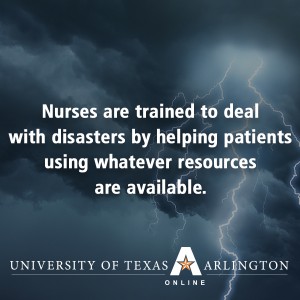
Unlike many professions, nurses must be ready to work despite bad weather. A Bachelor of Science in Nursing (BSN) prepares nurses to provide patient care, but they may have to learn through experience how to prepare for complications that arise due to bad weather. A preparation plan for carrying out their responsibilities as a nurse is essential.
How Should Nurses Prepare for Bad Weather?
Most nurses have to get to work regardless of the weather. Therefore it is important that nurses develop reliable transportation plans to get to work regardless of weather conditions such as wind, snow, sleet, rain, hail and fog.
If you drive to work, you should routinely inspect your tires, windshield wipers and the brakes. Membership to a car club and a cell phone are essential in case you run into trouble. If you live in an area that gets snow, you should always keep a shovel, blankets, water and warm clothing in the car in case you become stranded.
How Does Weather Affect Healthcare Facilities?
Hurricanes, tropical storms, tornados, blizzards, earthquakes, floods and wildfires can disrupt electrical service and cause devastating destruction. These problems are especially dangerous to healthcare facilities. The loss of power can interrupt the operation of life-saving equipment and damage to the building can put all occupants at risk.
How Should Nurses Prepare for a Weather Disaster at Work?
Hospitals must have an emergency management plan in place to comply with certification and accreditation requirements as well as various federal, state and local regulations. Typically, nurses learn a facility’s policy during their orientation, or nurse mangers hold meetings to instruct nurses about the course of action and the chain of command in the event of an emergency.
Healthcare facilities may also regularly schedule drills so nurses, physicians and healthcare professionals know the proper response to an emergency situation. If, for some reason, you do not know your facility’s disaster plan, you should ask your nurse manager about it. The nurse manager may explain it to you or tell you where you can find the information. Nurses should know the following:
- Who is in charge during the crisis?
- What is the nurse’s responsibility during an evacuation?
- How do you help if a mass casualty occurs?
- What equipment is necessary?
- What resources will you have available?
What Is the Nurse’s Role During Severe Weather?
For nurses, the priority is to keep patients safe and away from harm while continuing their treatment. You should know where the outlets are that are connected to the emergency generator and never use the elevator because the power can go out, leaving you trapped.
The common procedure during storms is to relocate the patients as close to the ground level as possible.
When patients must remain in their rooms during sever weather, consideration should be given to protecting them from any flying debris. For example, the nurse might close the blinds or drapes and push the beds away from the windows. Nurses should also lower beds as much as possible and give patients extra pillows and blankets for protection.
How Do Nurses Care for Disaster Patients?
As the weather event progresses, nurses must stay diligent about the safety of their current patients while receiving new ones. New patients come, and nurses will need to make assessments about who needs immediate care based on their state of consciousness, the severity of their injuries, the degree of blood loss and signs of distress.
Nurses may encounter difficult situations due to limited resources or equipment failure, so nurses must be flexible and apply creative problem-solving skills to help patients using whatever is still available.
Throughout an emergency, nurses may need to perform duties that are not part of their normal routine. In addition, nurses will provide care to patients of different ages and medical conditions they aren’t used to. Some patients may not speak English. Others may have different religious beliefs that dictate alternate approaches to care. This should not impede you from administering competent care.
As the climate continues to change, it is important for nurses to prepare for weather disasters. Nurses should practice emergency procedures so they become second nature. They must also remain calm throughout a weather event so patients continue to place their trust in nurses’ care.
Learn about the UT Arlington online BSN program.
Sources:
Springer Publishing: Disaster Preparedness for Bedside Nurses — Part Two
Minority Nurse: Crash Course in Hospital Disaster Planning and Response for Nurses